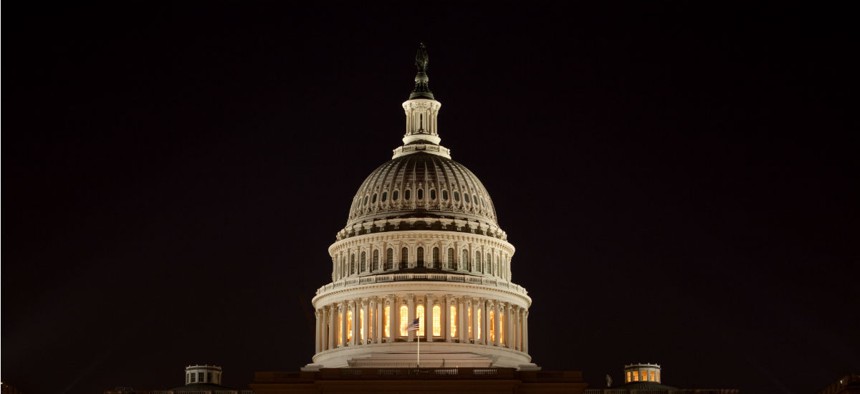After Last-Minute Drama, Congress Passes a Government Funding Bill
After a short “technical” shutdown, Congress early Friday passed a measure that would raise spending levels by $300 billion over the next two years.
It was an unexpected nail-biter: After a short “technical” shutdown, Congress early Friday passed a measure that would raise spending levels by $300 billion over the next two years.
The vote came hours after appropriations expired at midnight, shuttering agencies for the second time in three weeks after Sen. Rand Paul, R-Ky., derailed the Senate vote in a protest over ballooning deficit spending. The Senate finally passed the legislation early Friday with wide bipartisan support on a 71-28 vote.
The House convened at 4 a.m. and finally took up the legislation shortly after 5 a.m., passing the bill on a 240-186 vote.
The Bipartisan Budget Act, now heading to President Trump’s desk, will place agencies on their fifth continuing resolution of fiscal 2018, giving lawmakers until March 23 to set line-by-line appropriations for agencies across government.
The forthcoming omnibus spending bill would give appropriators an additional $63 billion for non-defense agencies, allocating a total $579 billion for fiscal 2018 for domestic agencies. Defense spending would increase by $80 billion. In fiscal 2019, non-defense spending would increase by $68 billion to $597 billion.
While the White House urged lawmakers to support the bill, the funding increases included in the legislation create a dilemma for the administration, which is set to release its own proposal for fiscal 2019 spending next week. "Unless the White House is clairvoyant, there’s no way the fiscal 2019 budget that’s due to be released this Monday will be relevant," said long-time budget watcher Stan Collender in a statement. Collender, executive vice president of global communications firm MSL, said the administration should postpone and revise its own budget release, otherwise, "it should be dismissed as a political anachronism and a waste of taxpayer dollars."
The Office of Management and Budget, in a statement of administration policy, said Congress should “enact without delay” the cuts Trump has proposed.
“It is critical that the Congress work to decrease non-defense spending in other areas to reduce America’s growing national debt,” OMB said. “The Bipartisan Budget Act provides non-defense discretionary spending levels higher than the administration deems necessary.”
Fiscal conservatives share the administration’s concerns, but most lawmakers praised the deal, with Republicans focusing largely on the increased military spending and Democrats on the relief civilian agencies will receive from the spending caps instituted by the 2011 Budget Control Act.
“Our middle class has suffered from a Congress that imposed a needless austerity on itself, limiting investment in jobs and education, infrastructure, scientific research, and more,” Senate Minority Leader Chuck Schumer, D-N.Y., said on Thursday. “This budget deal puts that to an end as well.”
House Speaker Paul Ryan, R-Wis., in urging lawmakers to pass the deal Friday morning, said, “The Bipartisan Budget Act includes vital disaster relief money and funding for community health centers, and it repeals Obamacare’s destructive Independent Payment Advisory Board. Most importantly, after years of underfunding and budget uncertainty, this agreement fully funds our military at the level requested by Secretary Mattis and our generals.”
To appease Democrats, who are demanding a solution for dealing with the status of immigrants whose protective status under the Deferred Action for Childhood Arrivals program will soon expire, Senate Majority Leader Mitch McConnell, R-Ky., promised to hold a series of votes on a variety of proposals on the subject. In the House, Ryan has promised to bring to the floor any measure President Trump would sign, a caveat that led many Democrats to oppose the spending agreement.
House Minority Leader Nancy Pelosi, D-Calif., on Thursday called on Ryan to “man up” and allow the chamber to vote on an array of immigration-related issues. Pelosi, however, did not whip her caucus to vote against the measure, even though she did not support it herself.







